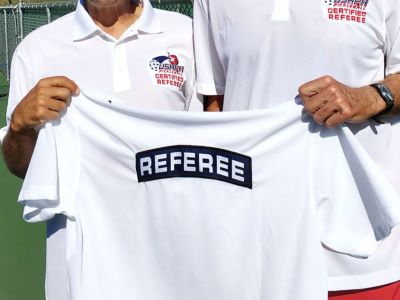If you love pickleball and want to get more involved, consider becoming a referee. A pickleball referee officiates matches and ensures the game is played according to the rules. A referee also helps maintain order, safety, and sportsmanship on the court.
Pickleball referees can be rewarding and challenging. You can improve your game knowledge, skills, earn money, and enjoy the best seat in the house. You can also contribute to the sport’s growth and development by providing professional and fair service to players and tournaments.

But how do you become a pickleball referee? What are the requirements, steps, and benefits of becoming one? This article answers these questions and more. We will also provide tips and resources to help you start your journey to pickleball refereedom.
How to Become a Pickleball Referee?
To become a pickleball referee, you must undergo training and pass a certification exam. It involves learning the rules, studying proper officiating techniques, and handling tricky situations during a match—some organizations, such as the U.S.A. Pickleball Association (USAPA) offers training and certification programs for pickleball officials. There are some general steps to follow.
Steps to Follow to Become a Referee
Here are the general steps to follow:
- Sign up for a referee training class. USAPA or other organizations offer online or in-person courses. You must register for the class and pay a fee.
- Study the USAPA officiating handbook. It is a comprehensive guide to pickleball rules and regulations established by USAPA. You can access it online or request a hard copy from USAPA. You should read through the handbook and familiarize yourself with the different sections, such as the court, equipment, and rules of play.
- Officiate at a non-sanctioned tournament. It is a practice opportunity to apply what you learned in the training class and the handbook. You must find a local tournament allowing non-certified referees to officiate and volunteer their services. You will gain experience and feedback from other referees and players.

- Take the referee and line judge test. These online tests assess your knowledge of the rules and ability to make correct calls during a match. You must score at least 85% on both tests to pass. You can take the tests on the USAPA website or through the U.S.A. Pickleball.
- Contact a certified referee to assess your skills. It is the final step to verify your pickleball referee’s competence. You must find a certified referee to observe you officiating a match and evaluate your performance. You will receive constructive feedback and improvement suggestions.
- Meet the Tiered Referee Rating Form (T.P.P.) Level 2 requirements. It is optional for those who want to advance their referee skills and rating. You must have at least one year’s experience as a pickleball referee to achieve this level. You must complete additional training, pass another exam, and receive positive evaluations from other certified referees.
- Officiate an amateur medal match. It is another optional step for those who want to further their referee career and officiate at higher-level tournaments. To qualify, you must have completed the T.P.P. Level 2 requirements and demonstrated excellence in officiating.
Levels of Pickleball Referee
Pickleball referees are officials who enforce the rules of the game and ensure fair play during matches. There are different levels of pickleball referees, each with their training, experience, and responsibility. Some standard levels are:
Newcomer
This is the beginner level for pickleball referees. At this level, you are assumed to be a novice at officiating a pickleball game. You may have completed some basic training and are just starting to gain experience as a referee. You can officiate recreational games or non-sanctioned tournaments to practice your skills.

Level 1 Referee
This is the intermediate level for pickleball referees. At this level, you are expected to have mastered tournament officiating fundamentals.
You must have completed a referee training class conducted by a registered referee trainer, studied the USAPA officiating handbook, and passed the online referee and line judge tests. You can officiate sanctioned tournaments at the local or regional level.
Level 2 Referee
This is the advanced level for pickleball referees. You must have more skills and knowledge at this level than a Level 1 referee.
You must have at least one year of experience as a pickleball referee, completed additional training, passed another exam, and received positive evaluations from other certified referees. Whether you are a national or international official, you are able to officiate in sanctioned tournaments.
Certified Referee
This is the highest level for pickleball referees. You have demonstrated reliable professionalism, skill competency, and rule knowledge at this level covering all situations at USA Pickleball-sanctioned tournaments.
You must have completed the Level 2 requirements and passed an evaluation by a referee evaluator. All sanctioned tournaments, including amateur medal matches and professional competitions, can be officiated by you.
Benefits of Becoming a Pickleball Referee
Becoming a pickleball referee has many benefits, both personal and professional. Some of these benefits are:
Helps in Understanding Rules
By becoming a referee, you will learn the rules of pickleball inside out. You will be able to apply them correctly and consistently in any situation. You will also be able to explain them clearly and confidently to others. It will help you improve your game and help others learn the game better.
Improves Pickleball Skills
By becoming a referee, you will also improve your pickleball skills, such as footwork, positioning, anticipation, concentration, and decision-making. You can observe and analyze different players and strategies from a close distance. You can also practice your skills by playing with other referees or players at tournaments.
It’s a Paid Job
By becoming a referee, you can earn money for your time and service. Depending on the tournament and certification levels, you can get paid anywhere from $5 to $25 per match. You can also get reimbursed for your travel expenses or receive other perks such as free meals or accommodation.
Best Seat in the House
You will enjoy the best seat by becoming a referee. You can watch some of the best players in action from up close. There will be some fantastic shots, rallies, and points that you might not see otherwise. You will also be able to interact with some of the top players and officials in the sport.
FAQs
Pickleball referees are three-tiered. The tiers are Level 1 Official, Level 2 Official, and Professional Official. Each tier requires its own set of qualifications and experience to advance to the next level.
Refereeing a pickleball game requires knowledge of the rules and regulations. The main responsibilities of a referee include ensuring fair play, calling all appropriate shots, and using your discretion to make good judgment calls. It is also essential to remain neutral throughout the match and respectfully handle disciplinary matters.
To practice pickleball skills, it is crucial to focus on mastering the essential strokes of the game – the serve, forehand, backhand, and volley. One should also develop court movement and agility to become a stronger player. The key is to practice regularly with one or more people so adjustments and corrections can be made along the way.
Wrap Up!
Becoming a pickleball referee is not only a great way to support the sport but also a great way to improve yourself as a player and a person. It is not easy, but it is rewarding and fulfilling.
If you want to become a pickleball referee, you can start by taking the online referee training class USA Pickleball offers. Their website also offers additional resources and information. These include the official rulebook, the officiating handbook, the referee casebook, and the referee search tool.
This article has given you insight and inspiration on becoming a pickleball referee. We wish you all the best on your journey and hope to see you on the court soon!

I am a professional physiotherapist and the author of the BallSportsPro. I worked with athletes of all levels, from amateur to professional, and i helped them overcome injuries and improve their performance. I am a certified Pickleball instructor and has been playing the sport for over 10 years.




